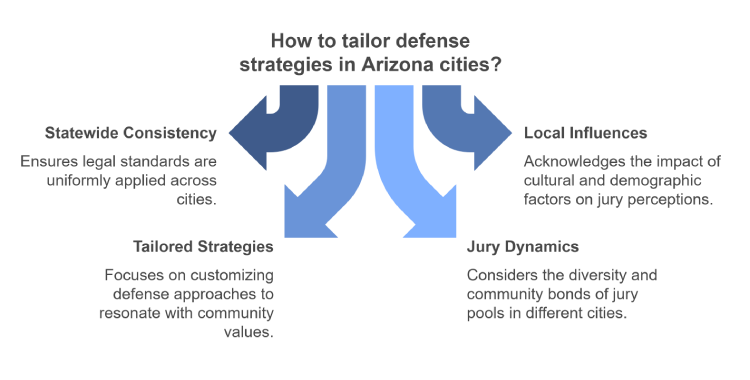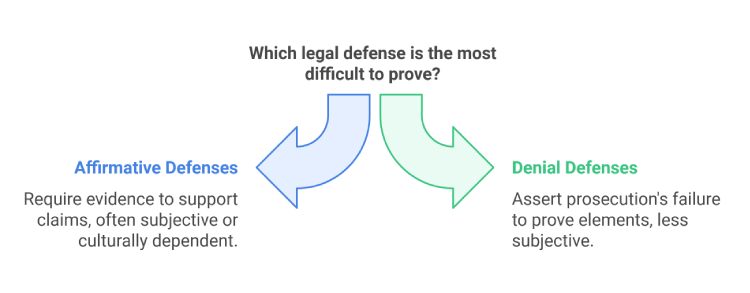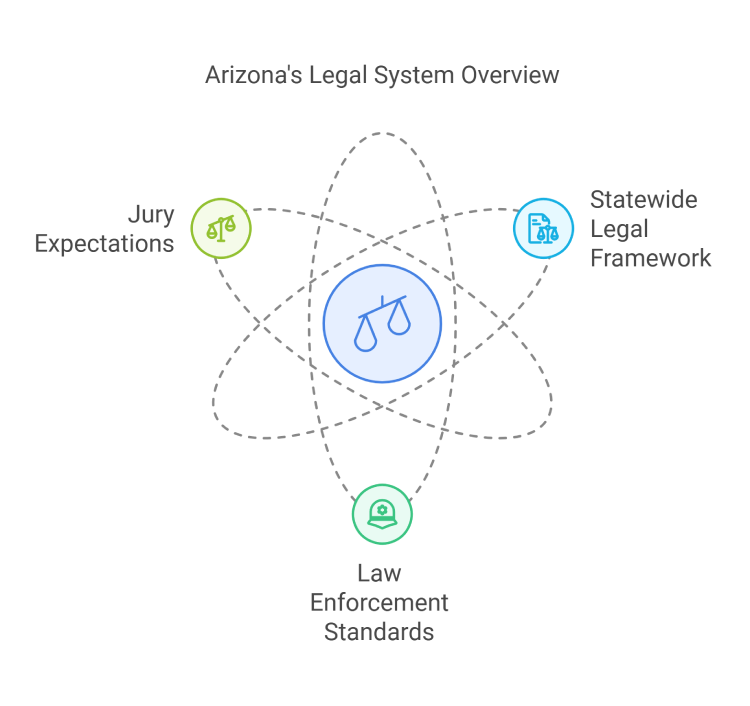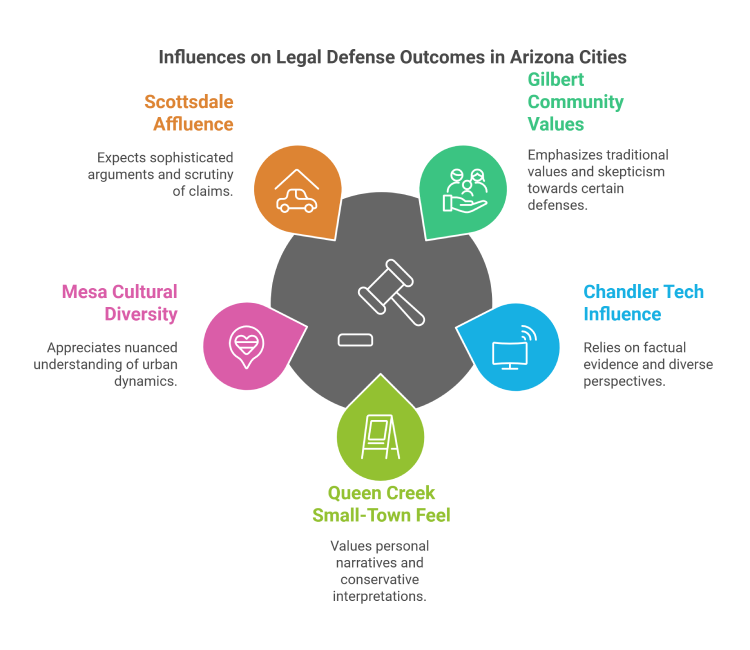Which Legal Defense Is the Most Difficult to Prove in Arizona?
When navigating the complexities of the justice system, crafting a successful legal defense requires understanding not only the laws but also the cultural and demographic nuances of the community where the trial occurs. Some defenses are inherently more challenging to prove due to legal standards, jury dynamics, and evidentiary requirements. This post explores these challenges, highlights unique considerations across different Arizona cities, and provides insights for anyone seeking clarity about the most difficult legal defenses to prove.
Table of Contents
ToggleKey Points
- Statewide Legal Consistency: Arizona’s criminal laws and judicial processes are consistent across all cities, ensuring that defenses like insanity, self-defense, and alibi follow the same legal standards.
- Local Influences Matter: Cities such as Mesa, Gilbert, Chandler, Queen Creek, and Scottsdale each have unique cultural and demographic characteristics that can affect jury perceptions and defense strategies.
- Tailored Defense Strategies: Understanding the community’s values and expectations in each city helps criminal defense attorneys present more compelling cases.
- Diverse Jury Dynamics: Urban areas like Mesa may have more diverse jury pools, while smaller cities like Queen Creek often reflect tighter community bonds.
- Evidence Presentation Varies: Different cities respond uniquely to evidence types; for example, Chandler’s tech-savvy population may prioritize digital records, while Gilbert’s family-oriented jurors might focus more on moral narratives.

Important Definitions
- Affirmative Defense: A legal argument requiring the defendant to provide evidence justifying or excusing their actions (e.g., self-defense, insanity).
- Denial Defense: A strategy where the defendant argues the prosecution has failed to prove the elements of the alleged crime beyond a reasonable doubt.
- Insanity Defense: A claim that the defendant was unable to understand the nature or wrongfulness of their actions due to severe mental illness, as defined by Arizona’s M’Naghten Rule.
- Self-Defense: The legal use of force to protect oneself from imminent harm, evaluated based on the reasonableness of the perceived threat and response.
- Entrapment: A defense arguing that law enforcement induced the defendant to commit a crime they would not have otherwise engaged in.
- Stand Your Ground Law: An Arizona law allowing individuals to use force in self-defense without a duty to retreat when faced with a legitimate threat.
- Necessity Defense: A defense that justifies a crime committed to prevent greater harm, requiring proof that no legal alternative existed.
The Nature of Legal Defenses
Legal defenses are akin to shields wielded by defendants as they navigate the battlefield of justice. These defenses can be categorized into two broad types: affirmative defenses and denial defenses. While denial defenses assert that the prosecution has failed to prove the elements of a crime, affirmative defenses require the defendant to introduce evidence supporting their claim.
Each defense has its challenges, but some are notably more difficult to prove due to their reliance on subjective interpretations, cultural perceptions, or high evidentiary standards.

The Insanity Defense: A Double-Edged Sword
Imagine trying to capture smoke with your bare hands; this metaphor perfectly encapsulates the challenge of proving an insanity defense. It requires not only demonstrating that the defendant was suffering from a severe mental illness but also that it impaired their ability to understand the nature of their actions. Despite its portrayal in popular media, the insanity defense is rarely successful. According to the NCBI, it is used in less than 1% of felony cases and only succeeds about 26% of the time.
Self-Defense: When Perception Meets Reality
Self-defense is a natural instinct—an inherent mechanism for survival. However, in the legal arena, it transforms into a complex dance of perception versus reality. Establishing self-defense requires proving that the threat was imminent and the response was proportional, a task often clouded by subjective interpretations. The Cornell Law School emphasizes the importance of reasonableness in assessing self-defense claims.
Alibi: The Quest for Unquestionable Proof
The alibi defense resembles a puzzle where every piece must fit perfectly. It hinges on establishing an airtight timeline that places the defendant elsewhere at the time of the crime. Yet, even with corroborating witnesses or technological evidence, doubts may linger in the minds of jurors. The quest for an unshakeable alibi becomes a race against time and skepticism.
Entrapment: Walking a Fine Line
Distinguishing between entrapment and legitimate law enforcement tactics is like treading a tightrope stretched over a chasm of ethical quandaries. The defense of entrapment involves proving that the defendant was induced to commit a crime they would not have otherwise engaged in. According to the FBI, entrapment does not occur when officers merely provide an opportunity for someone predisposed to commit a crime.
Similarities Across Cities in Arizona

- Statewide Legal Framework
- Laws: Arizona’s criminal laws, including the M’Naghten Rule for insanity and “Stand Your Ground” law for self-defense, apply uniformly across the state.
- Judicial Process: Courts follow the same procedural rules, and defenses must adhere to Arizona Revised Statutes (ARS).
- Law Enforcement Standards
- Police departments across cities like Gilbert, Chandler, and Queen Creek operate under Arizona law. While policies may differ slightly, core practices, such as Miranda rights and evidence handling, remain the same.
- Jury Expectations
- Arizona residents share a legal culture shaped by state statutes, meaning certain defenses, like self-defense or insanity, face similar levels of skepticism statewide.
Unique Considerations Across Arizona Cities
While Arizona law applies uniformly, local factors in cities like Mesa, Gilbert, Chandler, Queen Creek, and Scottsdale can influence how a defense is perceived and presented:

- Gilbert: Family-Oriented and Conservative Community
- Gilbert is known for its family-centric, conservative values. Jurors here may have stronger traditional views on personal responsibility and skepticism toward defenses like insanity or entrapment.
- This community might be more inclined to empathize with victims and require robust evidence to support claims of necessity or self-defense.
- Chandler: Diverse and Tech-Focused
- Chandler’s tech-driven population brings a mix of cultural backgrounds and professional expertise, which can influence jury dynamics. Jurors may be more analytical, relying heavily on factual evidence like surveillance footage or technological records for an alibi defense.
- Diversity in perspectives might make it easier to connect with jurors when explaining complex defenses, like necessity or mistake of fact.
- Queen Creek: Small-Town Feel
- Queen Creek has a tight-knit, small-town community feel. Jurors may lean toward conservative interpretations of law but might also empathize with defendants who present a compelling personal narrative.
- This environment can make jury selection critical—ensuring an unbiased panel is especially important in smaller communities.
- Mesa: Urban and Culturally Diverse
- Mesa’s larger population and cultural diversity make jury pools more varied, often encompassing people with broader perspectives.
- Defenses like self-defense or necessity might resonate better with jurors who have a nuanced understanding of community dynamics and the challenges of urban life.
- Scottsdale: Affluent and Business-Oriented
- Scottsdale’s wealthier demographic often includes jurors who expect sophisticated legal arguments and evidence.
- Jurors might scrutinize claims of financial duress or necessity, given the city’s relative affluence.
The Bottom Line
Crafting a successful legal defense is both an art and a science. Each defense—whether insanity, self-defense, alibi, or entrapment—requires meticulous preparation, credible evidence, and an understanding of the law. For defendants in cities like Mesa, Gilbert, Chandler, and Queen Creek, having an experienced criminal defense attorney by their side can make all the difference. Every defense is challenging in its own way, but with the right strategy, even the toughest cases can be approached with confidence.
FAQs
1. Is the insanity defense the same across all Arizona cities?
Yes, Arizona uses the M’Naghten Rule for the insanity defense, which is consistent statewide. However, jury perceptions of mental illness can vary depending on the community.
2. Why is jury selection so important for a criminal defense case?
Jury members bring their own experiences, biases, and values into the courtroom. Selecting a jury that aligns with or is open to understanding the nuances of the defense strategy can significantly impact the outcome.
3. How does the “Stand Your Ground” law affect self-defense cases?
Arizona’s “Stand Your Ground” law allows individuals to use force in self-defense without the need to retreat. However, the response must be proportional to the perceived threat and evaluated as reasonable by the court. Follow this link for more information about limits to the “Stand Your Ground” law in Arizona: LINK
4. What makes proving entrapment so difficult?
Entrapment requires showing that law enforcement actively induced a defendant to commit a crime they were not predisposed to commit. Simply providing an opportunity for a crime, such as setting up a sting operation, is not enough.
5. Are smaller communities like Queen Creek more challenging for certain defenses?
Yes, in smaller communities, tight-knit juries may share common values or biases that influence their interpretation of defenses like necessity or duress. An attorney familiar with the local culture can better navigate these challenges.
6. Does the evidence needed for an alibi defense differ in urban and rural areas?
The type of evidence may vary in effectiveness. For example, digital records might carry more weight in tech-savvy areas like Chandler, while personal testimonies might resonate more in smaller communities like Queen Creek.
7. How does Mesa’s diversity impact legal defenses?
Mesa’s diversity creates a jury pool with varied perspectives, which can be advantageous for complex defenses. However, this diversity also requires tailoring arguments to appeal to different viewpoints.
8. What role does expert testimony play in cities like Scottsdale?
In affluent areas like Scottsdale, jurors often expect high-quality expert testimony to substantiate claims, particularly in technical or medical defenses like insanity or necessity.
9. Do local law enforcement practices vary across Arizona cities?
While police departments operate under Arizona law, their approaches to investigations and arrests can differ slightly, which might influence how evidence is gathered and presented.
10. Why is understanding the local community important for a defense attorney?
Each community’s cultural norms and values can shape jury perceptions. A defense attorney who understands these nuances can craft arguments that resonate more effectively with the local jury.


